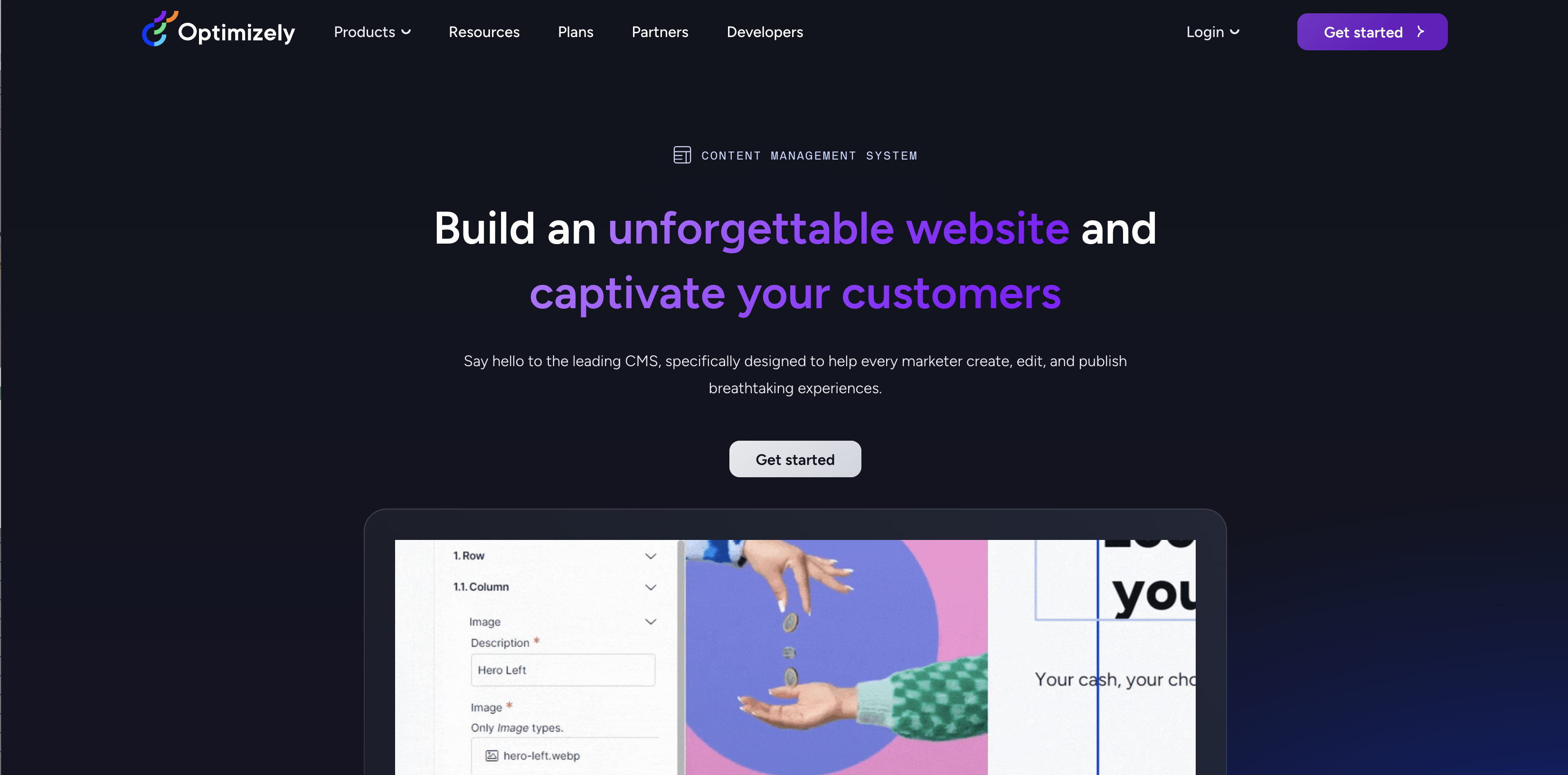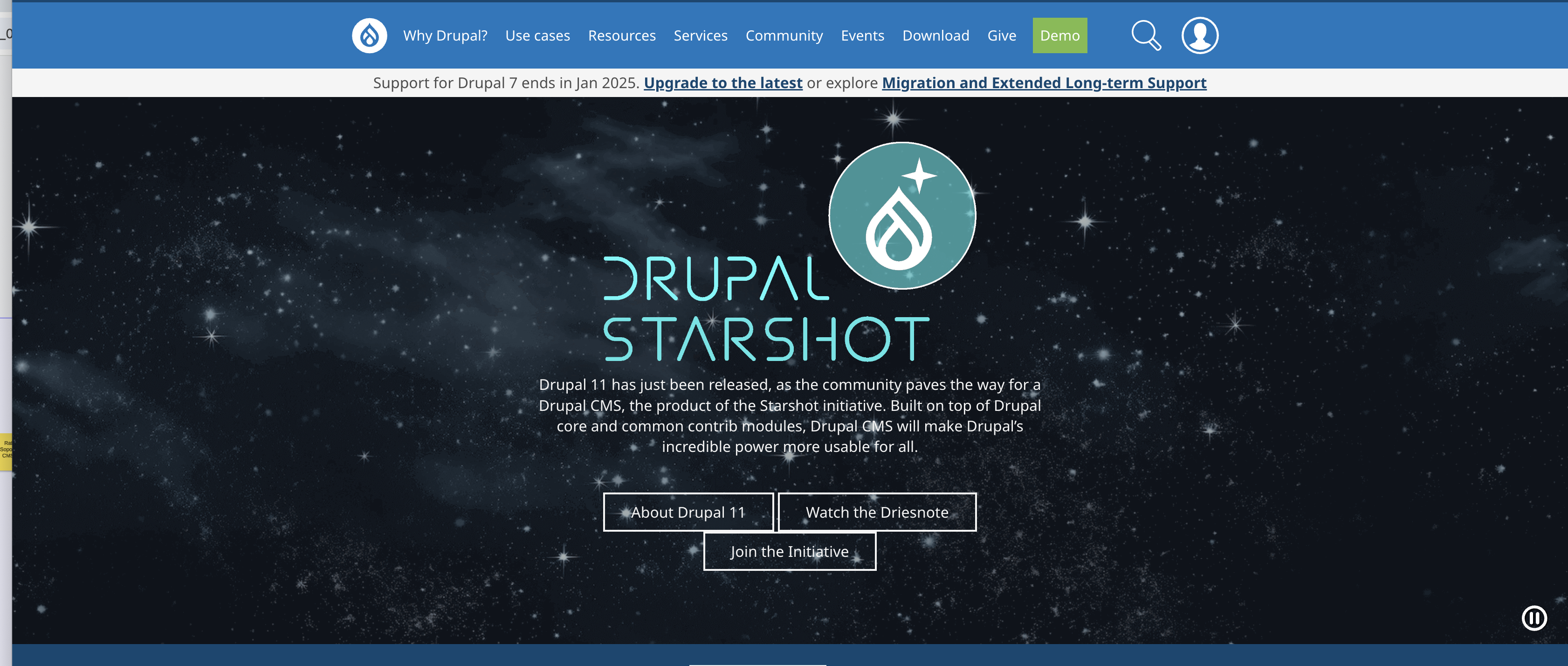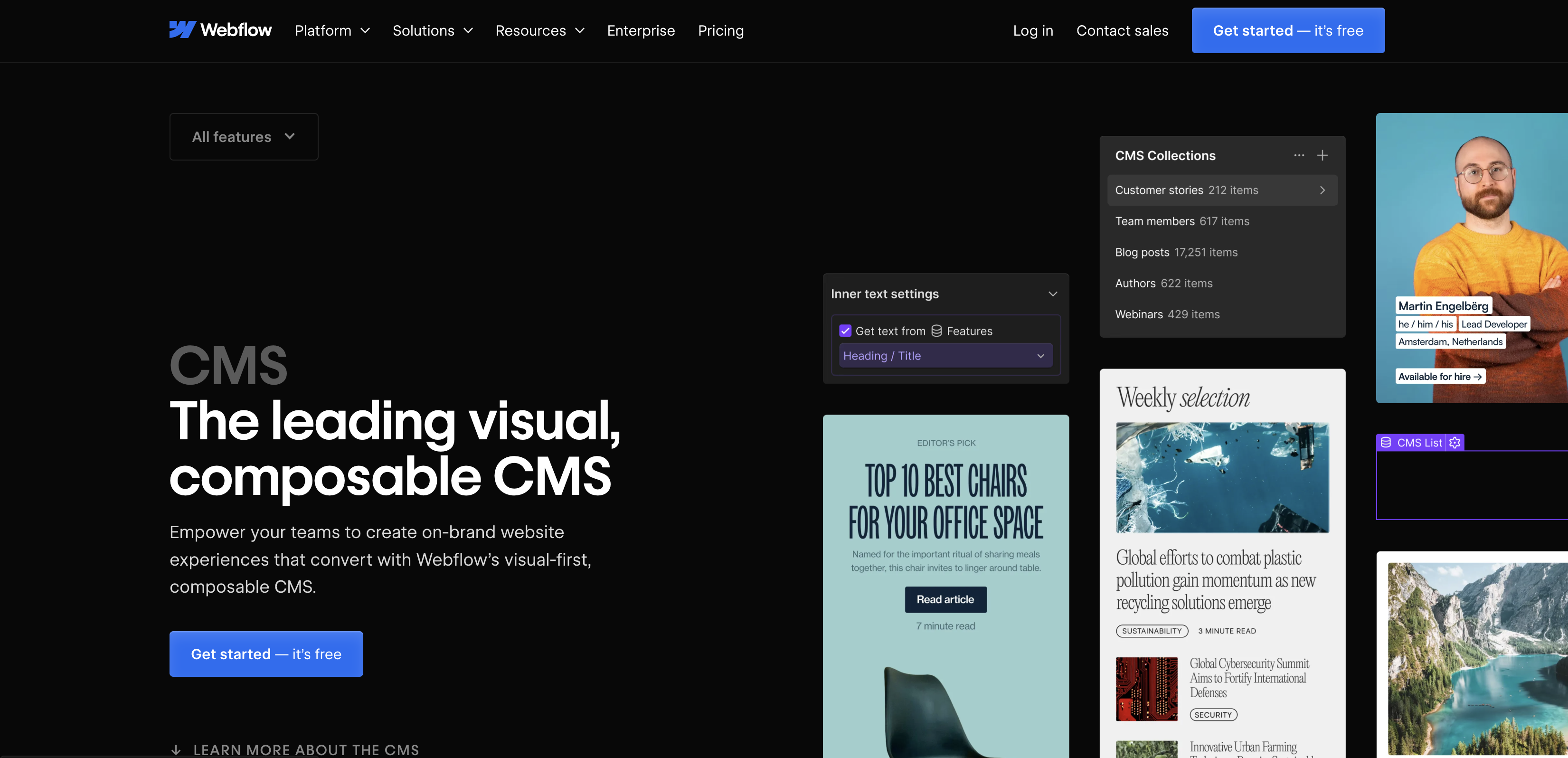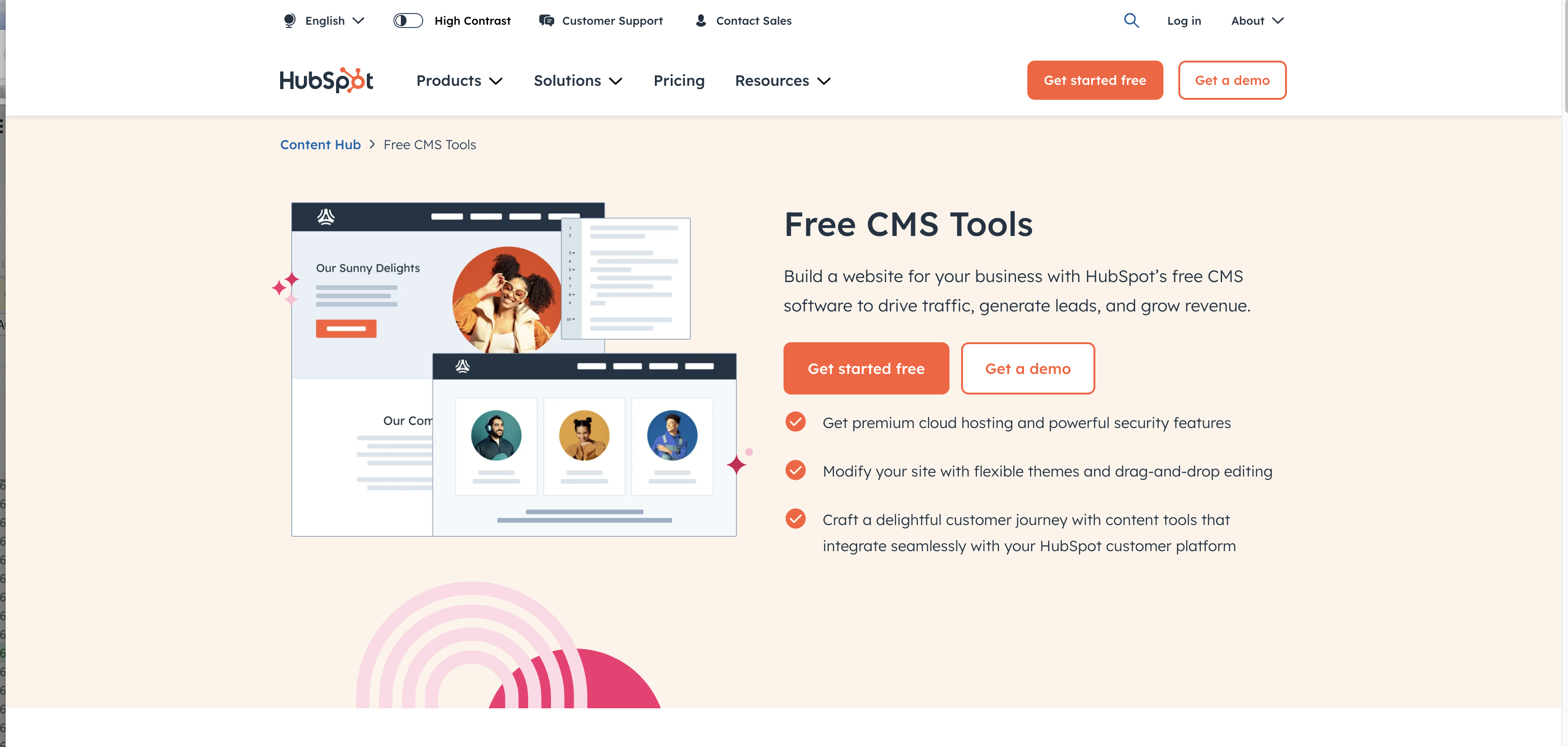The best CMS for SEO [2025 edition]
Looking for the best CMS for SEO? Explore our top choices, each packed with features to boost your site's search engine performance.


Take it from a verrrry jaded content marketer — ranking on page one of Google is easier said than done.
(Also, can we please say that a little louder for the leadership team in the back?)
Back in the early days, it took little more than sprinkling a few keywords here and there.

But nowadays, you need a well-thought-out SEO strategy and the absolute best tools to get the most organic traffic possible.
Your content management system, especially, can either seriously propel your SEO efforts — or drag them down.
In this article, we’ll get stuck into why choosing the right CMS is mission critical for SEO success (not to get all dramatic on you here).
We’ll explore some of the features that can give you the edge in search — and chat you through the top CMSs that were developed with SEO top of mind.
Sound good? Alrighty, let’s get into it:
How to choose the right CMS for SEO
Not sure which CMS platform will be the best fit for your business? While there’s no one-size-fits-all answer, here are a few questions to ask yourself before making any sort of investment:
- Just how tech-savvy is your team? Ideally, your CMS should give your content and SEO team control over SEO markup, indexing rules, redirects, and all of that good stuff. If you can’t push any SEO fixes live without relying on your engineering team, then that’s far from ideal.
- How large and complex is your website? Not all CMSs are made equal. While a small business with a single website can manage most of their basic SEO needs with a CMS like WordPress, it might not cut it if you’re managing tens of thousands of pages. Your CMS should be able to scale with your business and content needs. Have a proper think about whether a CMS can handle increasingly more complex workflows and additional functionality as your online presence continues to grow.
- How deep are your pockets? Some CMS platforms come with a free plan for small, local businesses (we’re looking at you again, WordPress!) Others can range massively in pricing, depending on the features you’re looking for. Figure out how far your budget can go without sacrificing the SEO functionality you need.
- How much is SEO a priority for you? If organic traffic is a major driver for your business, you’ll defs need a CMS that has advanced SEO capabilities.
What CMS features matter for SEO?
Now that you hopefully have a better sense of what your business needs, it’s time to get into some specifics. Here's a quick checklist of what you should look out for when choosing a CMS for SEO:
- Built-in SEO tools are your BFF: Your CMS should come with some basic built-in SEO tools that help with meta tag creation, URL redirection, and more. And don’t forget image optimization — have a lookout for a CMS that compresses images without sacrificing quality, adds alt text, and supports lazy loading. Bear in mind, no CMS can do everything you need for SEO, and that's okay. What matters is that it can work with other tools that specialize in SEO. SEO plugins optimize on-page content, while analytics tools you can integrate within your CMS, like Google Analytics, track performance.
- Mobile-friendly = SEO-friendly: Consider this a non-negotiable. Google goes absolutely nuts for a mobile-friendly website, so make sure your CMS is set up to create responsive designs that work on any device.
- Fast-loading pages are the one: Google also makes no secret of the fact that site speed has a knock-on effect on rankings. Be sure to choose a CMS that incorporates a Content Delivery Network (CDN) for faster loading times.
- Customization is 🤌: Trust, you’ll want your content and SEO team to have control of key elements, like URL structures, header tags, structured data, and more on-page elements. The ability to implement speakable schema (including frequently asked questions, question and answers, and how-to markups within your CMS is another feature to look out for, especially as Google’s AI Overview is poised to dominate the SERPs more and more in 2025.
- Technical SEO management is a must: Want Google to love your site? Look for features like automatic sitemap generation, internal link management, and the ability to implement canonical tags.
Forrester Wave™ for CMS
Top 7 CMSs for SEO
Available SEO-friendly CMSs come with a whole slew of different features and pricing. We’ve shortlisted a few of our favorites that suit a variety of businesses (and budgets) to help narrow down your search.
-
Optimizely

Image source: Optimizely
Best for: Enterprise-level websites
Why it stands out: Strong built-in experimentation tools and seamless marketing integrations
We don’t like to toot our own horn or anything (okay, we do maybe a little 😊), but for any enterprise-level organizations with thousands of pages to audit, optimize, and monitor, Optimizely CMS should be your top pick.
Why? Because it provides robust content analytics, A/B testing, and personalization options to help optimize content for both search engines and user experience. Opti CMS also offers full control over SEO essentials like URLs, metadata, and site performance, making it ideal for enterprises that need scalability and flexibility.
Pros:
- Built-in A/B testing for SEO and content experiments
- Strong technical SEO control with URL structure and metadata
- Scales well for large, enterprise-level websites
Cons:
- Requires more technical expertise
- Higher cost, potentially too much for small companies
-
Drupal

Caption
Best for: Large businesses with dedicated development teams for SEO projects
Why it stands out: Strong on technical SEO, with full control over URLs, metadata, and caching
An open-source CMS, Drupal allows for nearly unlimited customization, making it a great option for businesses with very specific SEO needs. In Drupal, you’ve got full control over meta tags, URL structures, and canonical URLs. It’s also strong on the technical SEO front, with built-in caching and mobile optimization features to help speed up page load times.
Pros:
- Lots of freedom to tailor on-page SEO elements
- Mobile optimization and caching improve site speed
- Offers SEO tools (like sitemap creation and SEO checklists)
Cons:
- Requires ongoing dev support to set up and manage SEO features
- Customizing each SEO element can be time- and resource-intensive
-
WordPress
Best for: Small or medium-sized businesses running smaller sites
Why it stands out: Plugin options for on-page SEO, metadata management, and easy sitemap generation
The OG CMS, WordPress is a big favorite for SEO, in large part because of its extensive library of plugins like Yoast and Rank Math, which handle everything from keyword optimization to auto-generating XML sitemaps. WordPress makes it easy to edit titles and descriptions, optimize images, and even handle schema markups, all with minimal coding. WordPress also comes with an AMP integration for faster-loading mobile pages, so massive props there.
Pros:
- Lots of SEO plugins makes SEO accessible to non-technical users
- Mobile-friendly themes
- Lots of helpful tutorials and a large community of users
Cons:
- Not ready to use out of the box
- Heavy use of plugins can slow down your site and impact rankings (and different plugins don’t always play well together)
- Frequent updates and overuse of plugins can lead to security vulnerabilities for your site
-
Wix

Image source: Wix
Best for: Smaller businesses with simple SEO needs
Why it stands out: User-friendly SEO tools and an intuitive platform
If you’re a small business owner (and a bit of an SEO noob, no shade intended), Wix could be a goer for your website. It comes with inbuilt SEO capabilities like customizable meta tags, optimized URL structures and image optimization, which makes it easy to put your best SEO foot forward without any handholding from a developer. Not the CMS for you if you’re looking to implement a more advanced SEO strategy, however.
Pros:
- Beginner-friendly tools for meta tags, alt text, etc.
- Automated mobile optimization
- Fast to set up for businesses without a developer
Cons:
- No control of elements like structured data or sitemaps
- Customization options for URLs are limited
-
Webflow

Caption
Best for: Design-first teams who need robust SEO features
Why it stands out: Generates clean, fast-loading code for strong SEO performance
Webflow blends no-code, visual content management with some really solid SEO capabilities. You get full control over alt tags, meta descriptions, and headers, alongside the ability to implement structured data and manage clean, SEO-friendly code. Plus, Webflow pages are lightning fast, which is only a good thing for your SEO.
Pros:
- Can fully customize code
- Fast page load times
- Supports schema markup directly within the CMS
Cons:
- Need a designer/developer with complex SEO tasks
- Limited SEO plugin options
-
Shopify

Image source: Shopify
Best for: Ecommerce businesses
Why it stands out: Offers user-friendly SEO features tailored for online stores
A great option for ecommerce stores, Shopify gives users the ability to optimize everything from product pages to alt text and meta descriptions. It can also automatically generate XML sitemaps and offers mobile optimized pages out of the box. That said, limitations in how you can structure URLs can be less than ideal for SEO.
Pros:
- Automatically optimizes product pages, meta tags and alt tags
- Mobile-responsive by default
- Built-in sitemap generation
Cons:
- Limited URL structure customization
- Reliance on third-party apps for more advanced SEO features can drive up total cost of ownership
-
HubSpot CMS

Image source: HubSpot
Best for: Marketing teams who need SEO tools paired with robust analytics
Why it stands out: Strong on-page SEO tools paired with A/B testing and analytics
HubSpot CMS was specifically built with marketers who don’t have developer-level skills in mind. Its built-in SEO tools automatically suggest ways to improve your site’s search rankings, from optimizing meta descriptions to fixing broken links. HubSpot’s CMS easily integrates with HubSpot’s other marketing tools, allowing you to track SEO performance in tandem with your overall marketing efforts.
Pros:
- Built-in SEO recommendations tool
- Integrates with other HubSpot marketing tools, like Hubspot CRM
- Basic A/B testing features allows you to play around with different formats and designs to see what works well for SEO
Cons:
- Developer resources needed to set up and manage SEO features
- Customizing SEO features can be time-intensive
SEO-long, farewell…👋
(Psst: The best bit about writing a blog conclusion? Getting to work in that massively cheesy pun you’ve been itching to use.)
But let’s get back on track. While choosing the right CMS is essential, it’s equally important to grasp SEO fundamentals, create high-quality content, and keep up with the changing landscape of search. Optimizely stands out as a top choice for several reasons. It’s a CMS designed with SEO in mind — its customization options, speed, and scalability empower you to deliver a digital experience that’s optimized for both search engines and human visitors.
Remember, SEO is a marathon, not a sprint. By continually learning, tweaking, and focusing on delivering value to your audience, your website will be well-positioned for visibility and sustained growth into next year... and beyond. 📈🎯🚀🔍

